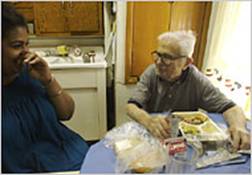|
|
For the Homebound Elderly, Fewer Knocks on the Door
By
Saki Knafo, The New York Times
June
15, 2008

Six days a week, Rafael Cordero, an employee of two senior citizen centers in Washington Heights, delivers hot meals to elderly people who lack the strength, stamina or, for one reason or another, ability to leave their homes.
“When they bring the food every day,” says José Simon, “at least I see somebody.”
Although Mr. Cordero’s title is driver, his job involves much more than operating a van. Once, while dropping off a meal at a woman’s apartment, he noticed that the woman was struggling to breathe. Then he smelled something that suggested that she had been unable to properly clean up after her cat. Suspecting that the woman had asthma that was worsened by the presence of the pet, he called her social worker, who arranged to have the cat removed from the apartment.
Meal deliverers like Mr. Cordero often serve as a critical link between the homebound elderly and the rest of the world, but that arrangement is poised to change. Last month, the city’s Department of Aging announced plans to restructure its meal-on-wheels program, which provides 17,000 meals daily. The changes, which will take effect during the next year, are meant to reduce the cost of each meal, so that the program can be expanded to include a growing number of clients.
Although the number of meals will remain the same, many people in the program will receive fewer visits from meal deliverers than in the past.
Under the current system, deliveries are made five times a week, and meals are typically served hot. Once the new plan goes into effect, many of the people served by the program will be visited only twice a week, and meals will arrive frozen.
Advocates for the elderly worry that homebound people may suffer, and the grumbling is particularly loud in Washington Heights, home to a high proportion of the city’s elderly residents.
In response to criticism, supporters of the plan point out that no one will be forced to abide by the changes. Those who prefer to continue receiving hot meals five times a week will be able to do so, and case managers will evaluate those who choose frozen meals to ensure that they are capable of preparing the meals themselves.
But many advocates for the elderly contend that just because the new system is optional doesn’t mean that it’s a good idea.
“Even if they have the option,” Monica Cohn, director of the Moriah Older Adult Luncheon Club, said of club members who take part in the meals-on-wheels program, “who’s going to check up on them as they are checked up on now?”
One participant in the program who likes things just as they are is José Simon, a former waiter. The other day, Mr. Simon sat on a plastic-covered armchair in the living room of his Broadway apartment and spoke about how much he valued regular visits from workers like Mr. Cordero.
“When they bring the food every day,” Mr. Simon said, “at least I see somebody, and I can ask them questions like: ‘Is the elevator working?’
‘How’s the weather?’ ” Smiling, he added, “Otherwise I might forget how to talk.”
More Information on US Health Issues
|
|



